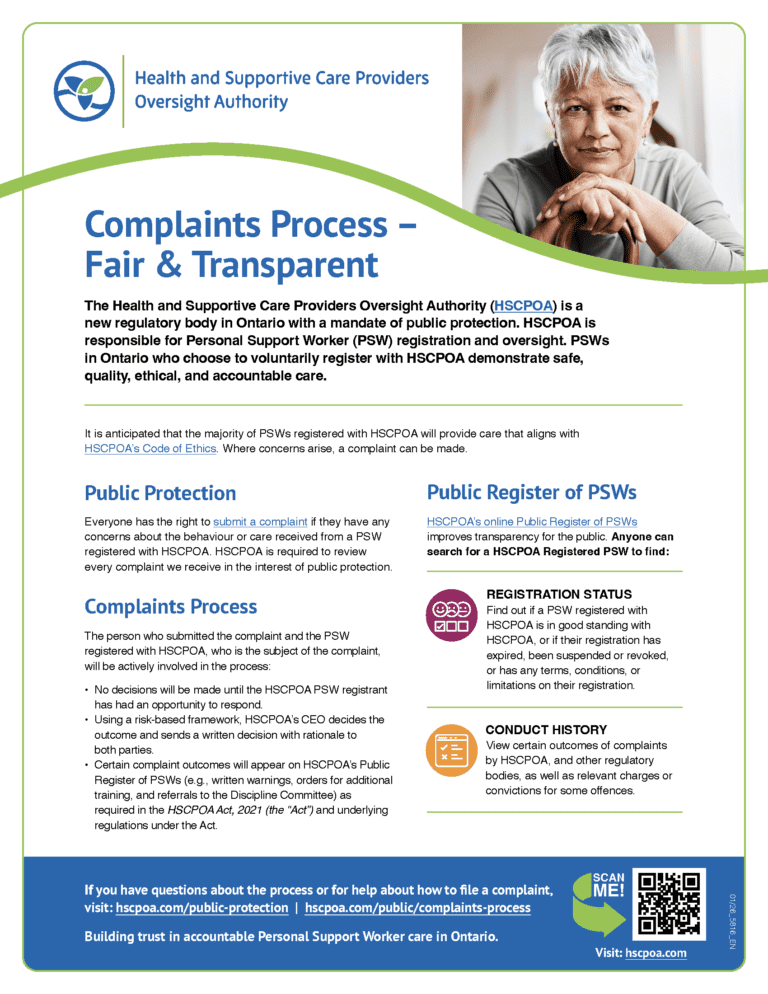Complaints Process
The creation of HSCPOA supports public protection by ensuring Personal Support Workers (PSWs) registered with HSCPOA (HSCPOA registrants) provide competent, safe, quality, and ethical health and supportive care services. Every HSCPOA registrant must comply with the requirements set out in HSCPOA’s Code of Ethics Regulation, under the Health and Supportive Care Providers Oversight Authority Act, 2021 (the “Act”) which lays the foundation for HSCPOA’s complaints process.
It is anticipated that the majority of registrants will provide care that aligns with HSCPOA’s Code of Ethics. When registered with HSCPOA, and included within HSCPOA’s Public Register of PSWs, it demonstrates that HSCPOA registrants as PSWs, are committed to providing competent, safe, quality, ethical, and accountable care like other regulated health professionals including nurses, dietitians, and physiotherapists. This helps protect the public. However, if a recipient of health and supportive care services has concerns with the care they received from a HSCPOA registrant, they have the right to submit a complaint to HSCPOA. HSCPOA is required to review every complaint we receive in the interest of public protection.
Below are answers to some commonly asked questions about the complaints process.
Within 14 days of receipt of a complaint, HSCPOA will send you a copy of the complaint along with relevant sections of the Act, and the regulations made under the Act. You will have 30 days to provide a written response to the concerns in the complaint. It is important to note that a decision will not be made about the complaint, until HSCPOA has received your response. Following that, HSCPOA’s CEO may ask for additional information from you and/or the complainant (individual who submitted the complaint). Once all relevant information is obtained, HSCPOA will issue a written decision, with rationale, to you and the complainant.
Yes, section 43(2)(b) of the Act states that you are required to fully cooperate with any requests for information received from the CEO with regards to complaints.
You do not need to have a lawyer, but it is your choice as to whether you obtain legal representation. Although HSCPOA will provide you with details about the complaints process, we cannot give you or the complainant advice about what you should or should not do. HSCPOA’s focus is to oversee a fair, impartial, and transparent complaints process that promotes public protection.
HSCPOA’s CEO reviews all complaints that are received and makes a decision using a risk-based approach. The CEO may choose any of the following actions:
- take no action;
- attempt to mediate or resolve the concerns;
- provide you with written advice;
- issue a written warning to you;
- require you to take educational courses or training;
- impose conditions on your certificate of registration; or
- refer contraventions of the Code of Ethics to the Discipline Committee.
HSCPOA follows due process and the principles of fundamental justice before HSCPOA’s CEO decides the outcome of a complaint. What this means is that before any decisions are made, a thorough investigation is conducted, which includes giving you an opportunity to provide a response to the concerns raised in the complaint. If you wish to appeal the CEO’s complaint decision, you can apply to the Ontario Divisional Court for a judicial review.
To support HSCPOA’s mandate of public protection, certain complaint outcomes may be posted under your HSCPOA registrant profile on our Public Register of PSWs, pursuant to the Register Regulation under the Act. Those outcomes include any written warnings, orders for educational courses or training, conditions on your certificate of registration, or referrals to the Discipline Committee.
There are various factors that could affect how long an investigation takes. No specific timeline is required under the HSCPOA Act or its regulations; however, HSCPOA strives to complete investigations as quickly as possible. Factors that can affect the length of an investigation include the following: how quickly you, the complainant, or another third party responds to HSCPOA’s request for a response or provides documents requested by HSCPOA, and witness(es) availability, if applicable. HSCPOA recognizes that having a complaint made about you may be unsettling, and that naturally you will be eagerly awaiting the outcome; however, conducting a thorough, fair and transparent investigation takes time. You will be provided with periodic updates as the investigation progresses, but if you would like an update on the status at any time, please reach out and we would be happy to assist.


